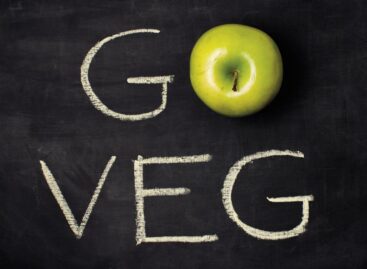Green Duel – Vegan vs. carnivore: To eat or not to eat?
On June 14, 2022, representatives of the Hungarian Vegan Association and the Association of Hungarian Meat Producers faced each other in a series of environmental policy discussions between the Institute of Climate Policy and the Reactor.
The number of people following the vegan diet and lifestyle is growing exponentially, especially in Western Europe, but there are also more and more people in Hungary, who join the vegan movement. Proponents of meat-free, completely plant-based nutrition say they are not only protecting their own health in this way, but also protecting our planet from the meat industry. On June 14, 2022, Barbara Gyimóthy, Vice President of the Hungarian Vegan Association, and Tamás Éder, President of the Association of Hungarian Meat Producers, discussed the environmental impacts of meat consumption and vegan nutrition on a series of environmental policy discussions between the Institute of Climate Policy and the Reactor.

Barbara Gyimóthy vice president, Hungarian Vegan Association / Adrienn Győri Adrienn moderator, Klímapolitikai Intézet / Tamás Éder president, Association of Hungarian Meat Producers
Environmental and climate protection are important for both parties
After covering the ethical and health issues, Barbara Gyimóthy also talked about the environmental impact of the meat industry, emphasizing that industrial animal husbandry is eroding the land and meat processing is seriously polluting the environment. He also pointed out that there is room for improvement in the housing conditions of the animals. Reflecting on this, Tamás Éder told the audience that the sector had really faced challenges in the field of pollution and waste management in the past. However, with the help of technological developments, the Hungarian meat industry pays special attention to the release of as little pollutants into the environment as possible, both in terms of livestock and slaughterhouses. As an example, he mentioned the state-of-the-art manure management system, which is regulated, and the fact that slaughterhouses recycle almost all waste, either in the form of animal feed or as biomass, or in other well-utilized ways, thus minimizing the impact on the environment. He also pointed out that the ecological footprint of the meat industry is highly dependent on the development of processing technologies. He was right with the vice-president of the Hungarian Vegan Association that customers are often unaware of the real price of food production.
Changing eating needs is a natural process
The two sides agreed that both vegan and mixed diets can be healthy, as well as unhealthy. The meeting emphasized the importance of a balanced diet and agreed that there was a growing interest in meat substitutes. Tamás Éder believes that the meat industry players need to react to this situation, but he also considers it important that shopping habits change at a natural pace, not in a forced way.
According to the president of the Association of Hungarian Meat Producers, traditional meat dishes still play a significant role in the diet of the majority of Hungarians, and this will not change in the foreseeable future. However, for those who occasionally want to replace meat consumption with plant-based foods, vegan products that replace animal-derived proteins available in stores can be a good choice.
Related news
Less meat might be consumed in German-speaking countries
🎧 Hallgasd a cikket: Lejátszás Szünet Folytatás Leállítás Nyelv: Auto…
Read more >A lake of wastewater is generated in Hungary in two to three weeks
🎧 Hallgasd a cikket: Lejátszás Szünet Folytatás Leállítás Nyelv: Auto…
Read more >Related news
Innovations, success stories and awards on the same stage
🎧 Hallgasd a cikket: Lejátszás Szünet Folytatás Leállítás Nyelv: Auto…
Read more >Farewell day at the 60th anniversary EuroShop trade fair
🎧 Hallgasd a cikket: Lejátszás Szünet Folytatás Leállítás Nyelv: Auto…
Read more >NAV: Women’s Day inspections begin
🎧 Hallgasd a cikket: Lejátszás Szünet Folytatás Leállítás Nyelv: Auto…
Read more >








